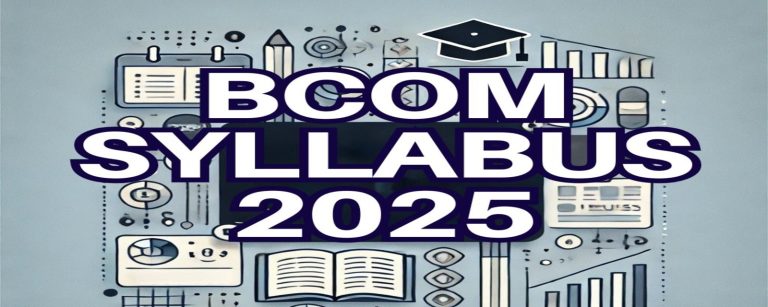The syllabus of BCom provides a wide-ranging education in commerce, finance, and business administration through six semesters. Each semester progresses from the last, with courses such as Financial Accounting, Business Law, and Microeconomics covered in the first semester. Every subject usually accounts for 100 marks.
As one progresses in the course, Corporate Accounting, Macro Economics, Business Statistics, Income Tax, Cost Accounting, and Marketing Management form part of the curriculum. More advanced semesters deal with Business Research, Human Resource Management, Business Ethics, Auditing, and Financial Management. Specialization in Entrepreneurship and International Business topics is permitted in later semesters through electives.
General BCom and specialized streams such as Finance, Accounting, or Taxation differ. Although the General BCom offers a general idea, specialized courses specialize in certain areas, providing specific skills and knowledge necessary for professions in particular areas of commerce and industry. This framework ensures that whether one does general studies or specialization, they are given a balanced and comprehensive education in business and commerce.
B Com Syllabus: Semester-Wise Breakdown
B Com syllabus has a detailed list of the structural curriculum of Bachelor of Commerce in B Com. This undergraduate program is three years and six semesters long. Thus, it exposes the students to a stronger level of studying in commerce and finance and other related management-related issues. Therefore, the electives and cores have evolved from Accounting and Economics while combined with Business Laws, through which several elective choices specialize them in line with their interest.
The B Com syllabus is designed so that the knowledge progresses from six semesters. It starts with the basic topics and leads to advanced concepts step by step. After completing the program, students become skilled and theoretically competent in dealing with real-world business issues.
| Semester | Core Subjects | Elective Papers |
| Semester I | Environmental Studies | English Language |
| Financial Accounting | Hindi or Modern Indian Language | |
| Business Organisation and Management | ||
| Semester II | Business Laws | Language (English / Hindi) |
| Business Mathematics and Statistics | ||
| Semester III | Company Law | Skill-based: Computer Applications in Business |
| Income Tax Laws | Cyber Crime & Laws | |
| Semester IV | Business Communication | Skill-based: E-Commerce / Investing in Stock Markets |
| Cost Accounting | ||
| Corporate Accounting | ||
| Semester V | Discipline-Specific Elective I: Principles of Marketing | Discipline-Specific Elective II: Corporate Tax Planning |
| Human Resource Management | ||
| Auditing and Corporate Governance | ||
| Semester VI | Discipline-Specific Elective III: Banking and Insurance | Discipline-Specific Elective IV: Principles of Microeconomics |
| Management Accounting | Economics of Regulation of Domestic and Foreign Exchange Markets | |
| International Business | ||
| Fundamentals of Financial Management |
B com Syllabus: Semester 1 and Semester 2
Semester 1 and Semester 2 students can enhance their commerce, environmental awareness, language, and mathematical skills through this BCom course structure. These semesters are designed to familiarize the students with the general concepts of business accounting and statistics and enhance the learners’ language skills. The main topics covered under the syllabus for Semester 1 and Semester 2 are discussed in detail as given below:
B Com Syllabus Semester 1
- Environmental Studies: This course mainly concerns environmental affairs and sustainability. In this course, the student learns about all the issues related to biodiversity, natural resources, pollution control, and climate change. From this course, the student is motivated toward developing an eco-friendly practice and awareness regarding environmental conservation.
- Financial Accounting: It gives principles of accounting, the process of preparation of financial statements, journal entries, ledger preparation, trial balance, and final accounts such as profit & loss accounts and balance sheets. Financial accounting equips students with all the relevant skills for recording and interpreting financial transactions.
- Business Organisation and Management: This course is step one in teaching basic principles of business organizations and management practices. It is a first take on organizational structures, business planning, and decision-making processes. Functions of management include planning, organizing, staffing, directing, and controlling important functions in effective business operations.
- English Language: This course is targeted at the English Language and focuses on developing communication skills related to a student in both written and oral English, like grammar, composition, comprehension, and vocabulary-building techniques that provide the ability to students for better communication in business.
B Com Syllabus Semester 2
- Business Law: It acquaints the students with the legal framework governing business operations. The subjects include the Indian Contract Act, the Sale of Goods Act, and the Partnership Act. The student learns about the legal rights, duties, and obligations, which is important in handling legal issues in commercial environments.
- Language: English/Hindi/Modern Indian Language This program focuses on proficiency in an additional language, such as Hindi or any Modern Indian Language, in addition to English. Students acquire linguistic skills that qualify them for effective communication across different regional and cultural business contexts.
- Business Mathematics and Statistics: This course integrates mathematical and statistical methods to solve business problems. Some topics presented to students are percentage calculations, interest computation, ratio, probability, correlation, and regression. All these skills help form crucial data-driven decisions in finance, marketing, and management.
- Hindi/Modern Indian Language: With this growth in language, side by side cultural appreciation gained due to Hindi as well as other Modern Indian Languages the courses encourage, so the communication, both written and spoken skills, increase among students and prepares the students and is equipped and geared up with regional or localized doings of doing business.
B Com Syllabus: Semester 3 and Semester 4
Bachelor of Commerce syllabus in Semester 3 and Semester 4 moves students from basic knowledge to special areas of commerce and business. The focus remains the same as the legal frameworks, taxation, corporate accounting, and technological changes that would help students handle complex business scenarios. Some of the following subjects are mentioned below:
B Com Syllabus Semester 3
- Company Law: Company law is subject to providing education on company law rules based on law. This includes topics of the Companies Act, company formation, management of a company, legal rights of the directors and shareholders, incorporation, memorandum and articles of association, and winding up. The students pursuing this course can easily handle corporate law-related problems and matters.
- Income Tax Law and Practice: Income Tax Law and Practice are the basic principles of taxation. They cover taxable income, tax exemption, deductions, and filing income tax returns. The topics include tax liability computation among individuals, firms, and companies. This topic is very useful for those who want to become a professional accountant and finance expert in the future.
- Language: This course provides a regional or modern Indian language of excellence and emphasizes the need for effective communication. With the help of the chosen language, a student can write fluently, read fluently, and converse fluently; therefore, working in different cultural and business environments is useful.
- Computer Applications in Business: This subject deals with the application of technology in business functions. Quotidian software applications, like MS Excel, MS Word, Tally, and other accounting software, are imparted to the students. The course covers the management of online transactions and cybersecurity practices. The course helps the students understand technology’s effective integration into business processes.
B Com Syllabus Semester 4
- Business Communication (English/ Hindi): This course will sharpen the student’s communication skills, including written and oral communication in English and Hindi. Students are ready to draft formal business letters, emails, and reports. This course also focuses on public speaking, presentations, and interpersonal communication for success at work.
- Corporate Accounting: Corporate Accounting deals with accounting practices peculiar to companies. The students can prepare consolidated financial statements, manage share capital and debentures, and account for mergers and acquisitions. This is very important in understanding financial management within corporate settings.
- Cost Accounting: It involves analyzing, allocating, and controlling the costs associated with a business operation. The subjects taught to students include cost classification, budgeting, and preparation of a cost sheet. In this subject, students can analyze ways of saving on costs and bringing in organizational operational efficiencies.
- E-commerce: E-commerce informs students of the e-business and electronic transaction world. All the subjects covering e-commerce models, payment gateways, digital marketing, and logistics management include the topics of the advantages that e-commerce offers for both businesses and consumers and the novel trends that online retail and B2B transactions embrace. It keeps students geared to understand and adapt to digitalized businesses.
B Com Syllabus: Semester 5 and Semester 6
The Bachelor of Commerce syllabus for Semester 5 and Semester 6 primarily deals with advanced concepts, industry-specific knowledge, and practical applications that equip the students for professional roles. Some subjects, such as human resource management, corporate tax planning, marketing, and international business, are covered this semester. Electives for the above semesters are also based on the chosen career path. Here is a detailed explanation of the topics covered in these semesters.
B Com Syllabus Semester 5
- Human Resource Management: HRM is properly managing human resources in any organization. This includes recruitment, training, motivating, performance appraisals, and labor relations. In the subject, it is familiar to the students that having effective HR strategies goes hand in hand with achieving the organizational goals, which increase productivity and satisfaction for the employees concerned.
- Principles of Marketing: This course gives insights into the basics of marketing. The curriculum includes market segmentation, consumer behavior, branding, pricing strategy, and promotional campaigns. It lets the students know how businesses create value for customers and how they come up with a strong market position.
- Auditing and CorporatGovernancenc: Auditing teaches the students how to read the financial records to know whether they have complied with or not, besides knowing whether it is right or wrong. It will comprise of the following: auditing principles, controls, vouching, and verification. Corporate Governance practices business operations ethically, with transparency and accountability towards the organization’s sustainable growth to build stakeholder trust.
- Fundamentals of Financial Management: This module exposes students to an organization’s guiding principles of finance management. Major subjects include investment decisions, capital budgeting, cost of capital, and working capital management. The course equips students with the tools to ensure sound financial decision-making and optimized resource use.
- Indirect Tax Law: This course encompasses indirect taxation, including GST and customs duty. Students know tax structures, compliance requirements, and how indirect taxes affect businesses and consumers.
- Entrepreneurship: Entrepreneurship is the kind of training that any individual needs to begin and manage a business. The students learn techniques to prepare business plans, calculate funding, and find a way out when issues come in the startup ecosystem. Innovation and entrepreneurial thinking are encouraged.
- Microeconomic principles: The residual economic theories explained to the student using resources, production, and pricing earlier. Based on these economic concepts, the student learns how markets behave, the production cost, and how they can maximize their profit.
B Com Syllabus Semester 6
- Corporate tax planning: It gives a broad overview of the corporate tax law and their implementations. It includes strategic tax plans that reduce tax liability, compliances regarding taxes for corporations, and the role taxation plays in decision-making at a financial level.
- It also consists of banking and insurance.: This subject deals with banking institutions and insurance companies’ operations. The topics involved include banking principles, credit creation, risk management, and the types of insurance products. Students are conversant with the financial services industry and its economic contribution.
- Management Accounting: Management Accounting focuses on using accounting information for decision-making. It teaches students to control costs, budgeting, financial analysis, and performance measurement. This topic includes the nature of accounting information related to business strategic decisions.
- Computerized Accounting System: The course is on accounting software, including Tally and QuickBooks. This course teaches students how to automate accounting procedures, generate financial reports, and adhere to accounting standards. The practical application of the computerized system is applied.
- International Business: Deals with the dynamics of international trade and commerce. There, the student discusses the processes of export/import, management of foreign exchange, entry strategies for international markets, and the role of MNCs’. The subject readies the students for working in the global economy.
- Office Management and Secretarial Practice: Knowledge of office administration and managerial office functions is acquired by the Office Management and Secretarial Practice course. The practice is used to learn the secretarial aspect through which offices help in record-keeping, communicating, and even organizing.
- Fundamentals of Investment: Among the subjects the students are introduced to is Investment, where the fundamental concept of investment planning and portfolio management is taught. Topics such as financial instruments, risk-return analysis, and investment strategies provide much help for students who want to enter the field of finance and wealth management.
- Consumer Protection: Consumer Protection is related to consumer rights and legal provisions for fair trading. The subject provides knowledge of consumers’ rights, redressal mechanisms for grievance, and the responsibility of business toward its consumers.
- Personal Selling and Salesmanship: Personal Selling and Salesmanship is a study area of techniques and skills in personal selling. The areas of study included developing skills for meeting customer needs, developing customer relationships, and closing sales efficiently. The course introduces the importance of interpersonal skills and persuasion in inefficient selling.
- Indian Economy: The Indian Economy is a subject that discusses the overview of India’s economy in terms of economic development, including all the important sectors such as agriculture, industries, and services. This includes discussing key topics like economic reforms, GDP growth, unemployment, and poverty. Such topics help the students understand how India’s economy is structured and functions.
Variations of B Com Programs
There are numerous B Com programs tailored to the learner’s requirements. Every version has a distinct benefit suited for each kind of learning style.
B Com (Full Time)
The traditional and the most commonly known type is the three-year full-time B Com. The full-time program requires three years and covers lectures, projects, and internships.
B Com (Honors)
This course has a more comprehensive curriculum than the general B Com. Honors students are usually allowed to acquire more specialized knowledge.
B Com (Online)
Online B Com programs are for those who are employed or do not have the opportunity to attend college. They provide flexibility and flexibility.
Integrated B Com Programs
Integrated programs can be taken that integrate B Com with professional courses like CA or MBA. These can be time-saving and prepare students with skills for competitive careers.
Career After B Com
B Com degree opens doors to various careers across industries. It can be a traditional finance role or an entrepreneurial pursuit. Top Career Options after B Com:
- CA: CA is an elite career encompassing accounting, auditing, and taxation.
- Financial Analyst: Compiles financial information to assist with investments.
- Tax Consultant: Provides consulting services for preparing personal and business taxes.
- Banking Professional: There is a wide scope for retail, investment, or corporate banking.
- Entrepreneur: Most students become entrepreneurs with the help of knowledge of commerce through their ventures.
Skills Required to Pursue Career after B Com
- Analytical thinking and solving problems.
- Understanding of finance and accounting principles.
- Communication and teamwork
- Sufficient expertise in MS Excel with accounting software such as Tally.
- After their bachelor’s, students may seek further qualifications like MBA/M.Co and professional certifications like CFA/ACCA.
B Com Syllabus FAQs
1. What are the main subjects in BCom?
The syllabus of B Com covers Financial Accounting, Business Law, Economics, Marketing, Auditing, and special electives. Each semester introduces new topics built on a foundation of comprehensive knowledge of commerce and management.
2. Which specialization is best in BCom?
As per the opinion of most experts, the best specialization in BCom in Accounting and Finance provides an excellent grounding in financial management, taxation, and accounting procedures, which results in various lucrative career avenues such as accountant, auditor, financial analyst, etc.
3. Is math compulsory in the BCom syllabus?
Although a general B.Com course does not usually need mathematics as a compulsory subject, some universities might need it or consider it for admission, particularly for B.Com (Hons) courses.
4. Is the B Com syllabus updated from time to time?
Yes, almost all universities update the B Com syllabus by incorporating emerging topics into the curriculum, such as e-commerce, digital marketing, and fintech.
5. Am I allowed to pursue professional courses together with B Com?
Yes, students often study B Com with professional courses such as CA, CS, or CFA. Many B Com programs now tune the syllabus to match these certifications.



